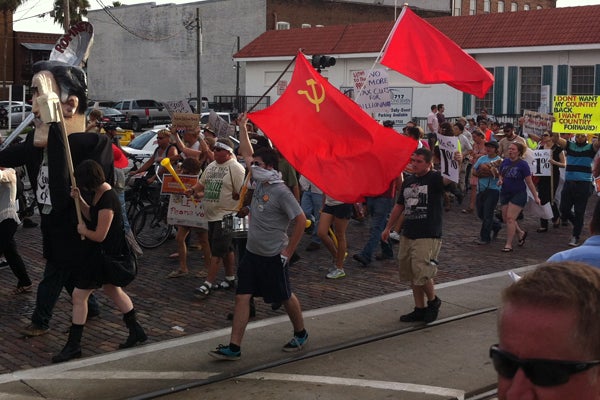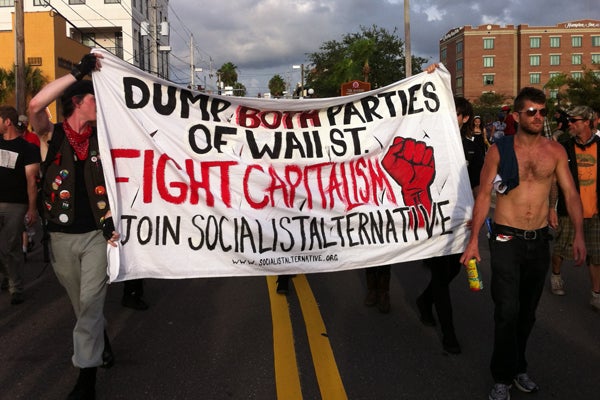Brian has a tough job. He’s a socialist trying to sell a commodity. Wandering around Tuesday’s protest near the Republican convention in Tampa, FL, he asked for donations in exchange for the newspaper of his organization, the Socialist Alternative.
His offer was a bit jarring, so I asked him whether he saw the irony in a socialist engaging in a voluntary, mutually beneficial financial transaction. The conversation quickly devolved into the fundamentals of political and economic theory. I abandoned my proselytizing when Brian, who was immensely friendly and perfectly willing to engage in debate, admitted that implementing his global socialist ideal might require quite a bit of violence – indeed, a world-wide revolution. He still holds out hope of incremental political change, though he acknowledged it’s not likely.
While we spent a good 15 minutes on weighty topics of political economy, no part of our conversation was more revealing, I thought, than that first request for a “donation.” Brian waxed philosophical about the importance of socialism, but attended the protest to engage in the most basic, fundamental activity of a capitalist economy: free exchange.
That is not to say that there is not a strong socialist presence among the anti-RNC demonstrations in Tampa. Indeed, as the crowd marched from Centennial Park – the site of an anti-voter ID rally staged by a few left-wing organizations, including Color of Change – through Tampa’s historic Ybor district, hammers and sickles were proudly displayed.
These displays notwithstanding, one can’t escape the disconnect between the protesters’ vilification of capitalism and actions or words that show at least some support for free markets.
The folks at Revealing Politics captured this video of a very angry protester denouncing capitalism, and suggesting the government should be overthrown. Asked what system should replace the current one, he tells the interviewer, “People should have the right to do what they please as long as it doesn’t…hurt anyone else.”
That is a pretty boilerplate definition of libertarianism. The government acts as a referee to ensure that citizens’ lives, liberty, and property are protected, and those citizens are free to do as they please within a system of minimal laws enforced by the state.
Say what you will about that vision, but it is most certainly one that values free-market capitalism.
What to make of this disconnect? The conflation of capitalism and corporatism (or cronyism) has been a virtual constant among the Occupy movement since its inception last year. Protesters rail against capitalism, but, in large part, the injustices they so despise are products not of the free market but of collusion between business and government.
In May, Heritage hosted an event that pondered whether Occupiers were “persuadable” and whether conservatives should bother engaging them. My experiences in Tampa suggest that many of these protesters are open to free market capitalism. They just have a skewed understanding of what that means.































